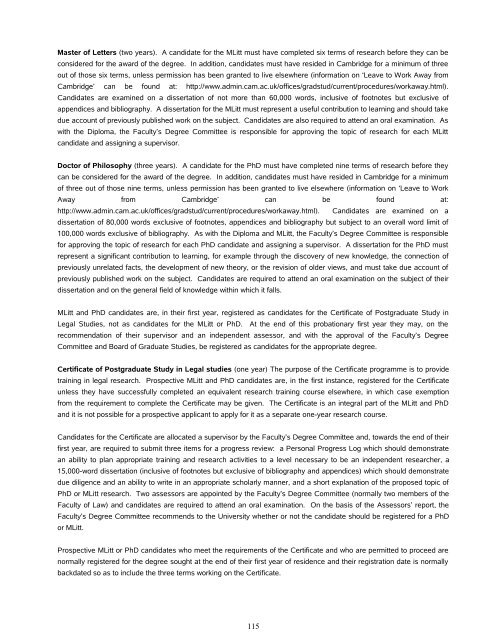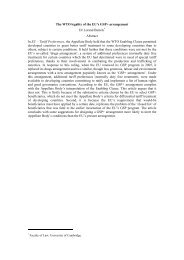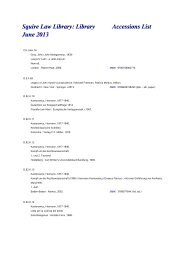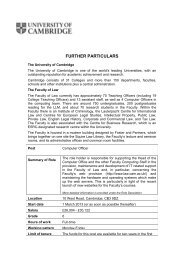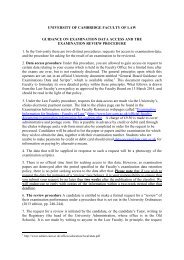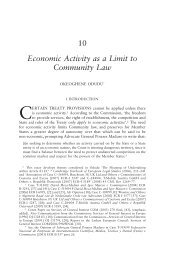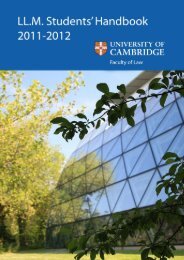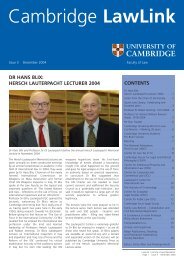Contents - Faculty of Law - University of Cambridge
Contents - Faculty of Law - University of Cambridge
Contents - Faculty of Law - University of Cambridge
You also want an ePaper? Increase the reach of your titles
YUMPU automatically turns print PDFs into web optimized ePapers that Google loves.
Master <strong>of</strong> Letters (two years). A candidate for the MLitt must have completed six terms <strong>of</strong> research before they can beconsidered for the award <strong>of</strong> the degree. In addition, candidates must have resided in <strong>Cambridge</strong> for a minimum <strong>of</strong> threeout <strong>of</strong> those six terms, unless permission has been granted to live elsewhere (information on ‘Leave to Work Away from<strong>Cambridge</strong>’ can be found at: http://www.admin.cam.ac.uk/<strong>of</strong>fices/gradstud/current/procedures/workaway.html).Candidates are examined on a dissertation <strong>of</strong> not more than 60,000 words, inclusive <strong>of</strong> footnotes but exclusive <strong>of</strong>appendices and bibliography. A dissertation for the MLitt must represent a useful contribution to learning and should takedue account <strong>of</strong> previously published work on the subject. Candidates are also required to attend an oral examination. Aswith the Diploma, the <strong>Faculty</strong>’s Degree Committee is responsible for approving the topic <strong>of</strong> research for each MLittcandidate and assigning a supervisor.Doctor <strong>of</strong> Philosophy (three years). A candidate for the PhD must have completed nine terms <strong>of</strong> research before theycan be considered for the award <strong>of</strong> the degree. In addition, candidates must have resided in <strong>Cambridge</strong> for a minimum<strong>of</strong> three out <strong>of</strong> those nine terms, unless permission has been granted to live elsewhere (information on ‘Leave to WorkAway from <strong>Cambridge</strong>’ can be found at:http://www.admin.cam.ac.uk/<strong>of</strong>fices/gradstud/current/procedures/workaway.html). Candidates are examined on adissertation <strong>of</strong> 80,000 words exclusive <strong>of</strong> footnotes, appendices and bibliography but subject to an overall word limit <strong>of</strong>100,000 words exclusive <strong>of</strong> bibliography. As with the Diploma and MLitt, the <strong>Faculty</strong>’s Degree Committee is responsiblefor approving the topic <strong>of</strong> research for each PhD candidate and assigning a supervisor. A dissertation for the PhD mustrepresent a significant contribution to learning, for example through the discovery <strong>of</strong> new knowledge, the connection <strong>of</strong>previously unrelated facts, the development <strong>of</strong> new theory, or the revision <strong>of</strong> older views, and must take due account <strong>of</strong>previously published work on the subject. Candidates are required to attend an oral examination on the subject <strong>of</strong> theirdissertation and on the general field <strong>of</strong> knowledge within which it falls.MLitt and PhD candidates are, in their first year, registered as candidates for the Certificate <strong>of</strong> Postgraduate Study inLegal Studies, not as candidates for the MLitt or PhD. At the end <strong>of</strong> this probationary first year they may, on therecommendation <strong>of</strong> their supervisor and an independent assessor, and with the approval <strong>of</strong> the <strong>Faculty</strong>’s DegreeCommittee and Board <strong>of</strong> Graduate Studies, be registered as candidates for the appropriate degree.Certificate <strong>of</strong> Postgraduate Study in Legal studies (one year) The purpose <strong>of</strong> the Certificate programme is to providetraining in legal research. Prospective MLitt and PhD candidates are, in the first instance, registered for the Certificateunless they have successfully completed an equivalent research training course elsewhere, in which case exemptionfrom the requirement to complete the Certificate may be given. The Certificate is an integral part <strong>of</strong> the MLitt and PhDand it is not possible for a prospective applicant to apply for it as a separate one-year research course.Candidates for the Certificate are allocated a supervisor by the <strong>Faculty</strong>’s Degree Committee and, towards the end <strong>of</strong> theirfirst year, are required to submit three items for a progress review: a Personal Progress Log which should demonstratean ability to plan appropriate training and research activities to a level necessary to be an independent researcher, a15,000-word dissertation (inclusive <strong>of</strong> footnotes but exclusive <strong>of</strong> bibliography and appendices) which should demonstratedue diligence and an ability to write in an appropriate scholarly manner, and a short explanation <strong>of</strong> the proposed topic <strong>of</strong>PhD or MLitt research. Two assessors are appointed by the <strong>Faculty</strong>’s Degree Committee (normally two members <strong>of</strong> the<strong>Faculty</strong> <strong>of</strong> <strong>Law</strong>) and candidates are required to attend an oral examination. On the basis <strong>of</strong> the Assessors’ report, the<strong>Faculty</strong>’s Degree Committee recommends to the <strong>University</strong> whether or not the candidate should be registered for a PhDor MLitt.Prospective MLitt or PhD candidates who meet the requirements <strong>of</strong> the Certificate and who are permitted to proceed arenormally registered for the degree sought at the end <strong>of</strong> their first year <strong>of</strong> residence and their registration date is normallybackdated so as to include the three terms working on the Certificate.115


